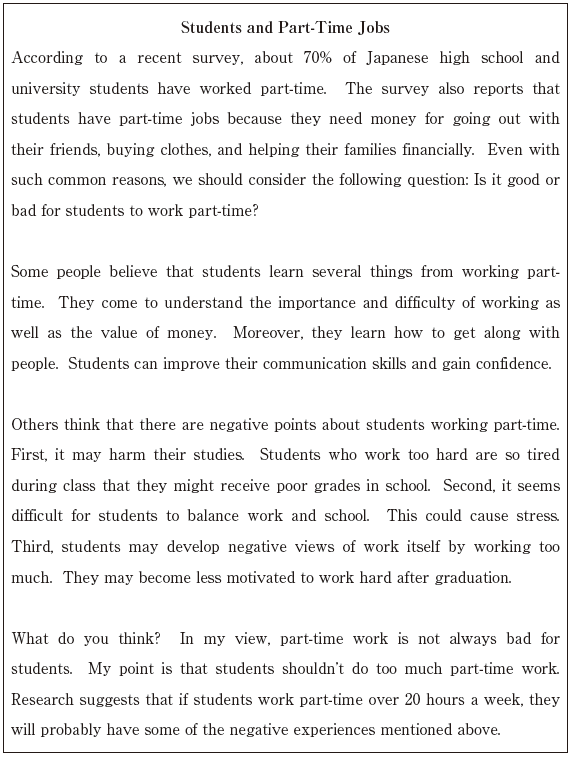You are going to have a debate about students working part-time. In order to prepare for the debate, your group is reading the article below.

問1 In the survey mentioned in the article, the students were asked, “( )”
1. Have you ever worked part-time abroad?
2. How much money per week do you make working part-time?
3. What kind of part-time jobs would be good for you?
4. Why do you work part-time?
問2 Your group wants to collect opinions supporting students working parttime. One such opinion in the article is that students ( ).
1. can become good communicators
2. mostly have worked part-time
3. will have a better chance of getting a full-time job
4. will learn how to dress appropriately
問3 Your group wants to collect opinions opposing students working parttime. One such opinion in the article is that students ( ).
1. cannot be helpful in the workplace
2. might perform poorly in class
3. should spend more time with their family
4. work part-time to buy what they want
問4 If students work over 20 hours a week, they may ( ).
1. begin to feel they need a well-paid job
2. continue to work hard at part-time jobs
3. lose interest in working hard after leaving school
4. want to be independent of their families
問5 The writer of this article ( ) students working part-time.
1. does not have any particular opinion about
2. partly agrees with
3. strongly agrees with
4. strongly disagrees with
【解説】問1 正解率 61.1%
「記事で言及された調査では、学生は ( ) と質問されました」
1. Have you ever worked part-time abroad?
「海外でアルバイトをしたことがありますか」
2. How much money per week do you make working part-time?
「アルバイトで、週あたりどれくらいお金を稼ぎますか」
このような話はありません。1. は「abroad」、2. は「How much money」で、判断できると思います。この二つの選択肢は違います。
3. What kind of part-time jobs would be good for you?
「どのような種類のアルバイトがあなたにとって良いですか」
本文の第一段落に、このような疑問文があります。
「アルバイトをすることは学生にとって良いですか、悪いですか」
これを曲解して、「3」を正解とした人がいたかもしれません。ですが、内容が違いますのでダメです。
4. Why do you work part-time?
「なぜアルバイトをしますか」
第一段落にこうあります。
「調査によると、友達と外出したり、服を購入したり、家族の財政を支えたりするためにお金が必要なので、学生はアルバイトをしています」
こういう答えが返ってくるということは、選択肢のような質問をされたと考えられますね。ということで、正解は「4」です。
本文に直接その質問が書かれていませんが、書かれてあることから、それを推測するという問題でした。本文に書かれていない分、若干正解率が低くなっていますね。
【解説】問2 正解率 76.4%
「あなたのグループは、アルバイトをする学生を支持する意見を集めたいと考えています。 記事の中のそのような意見の1つは、学生は ( ) ということです」
アルバイト賛成の意見を、本文から探せばよいです。これは第二段落にあります。
2. mostly have worked part-time
「主にパートタイムで働いている」
少しの時間だからいいだろう、ということでしょうか。そのような話は、この第二段落には書いていませんね。
第四段落でそういう話もありますが、長時間働いてはいけないという話の裏返しであって、アルバイト賛成の意見として言っているのではありません。したがってこの選択肢はダメです。
3. will have a better chance of getting a full-time job
「フルタイムの仕事を得る、より良い機会があるだろう」
アルバイトから正社員になるというのはよく聞く話ですけれど、ここには書かれていませんね。
4. will learn how to dress appropriately
「適切な着飾り方を学ぶだろう」
こんな話はありませんでしたね。この選択肢もダメです。
1. can become good communicators
「良いコミュニケーションがとれる人になることができる」
第二段落の最後に、こうあります。
「学生はコミュニケーション能力を向上させることができます」
ということで、正解は「1」です。
第二段落にはアルバイトの利点として「お金の価値と同様に、仕事の大切さ難しさを学ぶことができる」とも書いてありましたが、今回の問題には関係ありませんでしたね。
【解説】問3 正解率 72.0%
「あなたのグループは、アルバイトをする学生に反対する意見を集めたいと考えています。 記事のそのような意見の1つは、学生は ( ) ということです」
1. cannot be helpful in the workplace
「職場で役に立たない」
2. might perform poorly in class
「授業でのパフォーマンスが悪くなるかもしれない」
3. should spend more time with their family
「家族ともっと時間を過ごすべき」
4. work part-time to buy what they want
「彼らが欲しいものを買うためにアルバイトをする」
第三段落でアルバイトに対する反対意見を、3つ言っています。そのうちの最初がこれです。
「働きすぎの生徒は授業中にとても疲れているので、学校では成績が悪いかもしれません」
ということで、正解は「2」です。
反対意見の残りの2つは「学校と仕事のバランスをとるのが難しい」と「働き過ぎると仕事にネガティブな見方をしてしまうかもしれない」というものでした。
他の選択肢に、当てはまるものはありませんね。
【解説】問4 正解率 74.8%
「もし学生が週20時間以上働くと、彼らは ( ) かもしれない」
1. begin to feel they need a well-paid job
「良い給料の仕事が必要と感じるようになる」
2. continue to work hard at part-time jobs
「アルバイトに励み続ける」
3. lose interest in working hard after leaving school
「学校を出て一生懸命働くことに興味を失う」
4. want to be independent of their families
「家族から独立したい」
設問の over 20 hours a week に注目すると、第四段落の最後にこうあります。
「調査によると、学生が週に20時間以上アルバイトしている場合、おそらく上で言及されているネガティブな経験のいくつかを経験するでしょう」
「the negative experiences mentioned above / 上で言及されているネガティブな経験」というのは、問3で確認した第三段落のものです。
そのうち「働き過ぎると仕事にネガティブな見方をしてしまうかもしれない」の次の、第三段落最終文に書いてあるのは、こういうことです。
「彼らは卒業後、一生懸命働く意欲が減るかもしれません」
ということで正解は、「3」です。
【解説】問5 正解率 59.6%
「この記事の筆者はアルバイトをする学生に ( )」
1. does not have any particular opinion about
「について特に意見はありません」
2. partly agrees with
「部分的に賛成です」
3. strongly agrees with
「強く賛成です」
4. strongly disagrees with
「強く反対です」
筆者の意見は最終段落にあることが多いです。こう書いてあります。
「私の意見としては、学生にとってアルバイトは常に悪いわけではない」
ということで、正解は「2」です。
not always で「常に~ではない」と部分否定になっています。これを「常に~ではない」と間違えたり、あるいは、not を見落としてミスする人がいたかもしれません。
特に not を見落とすと、そのあとが否定的な話ばかりになるので、筆者は反対意見だと感じてしまうかもしれません。注意しましょう。



コメントをどうぞ